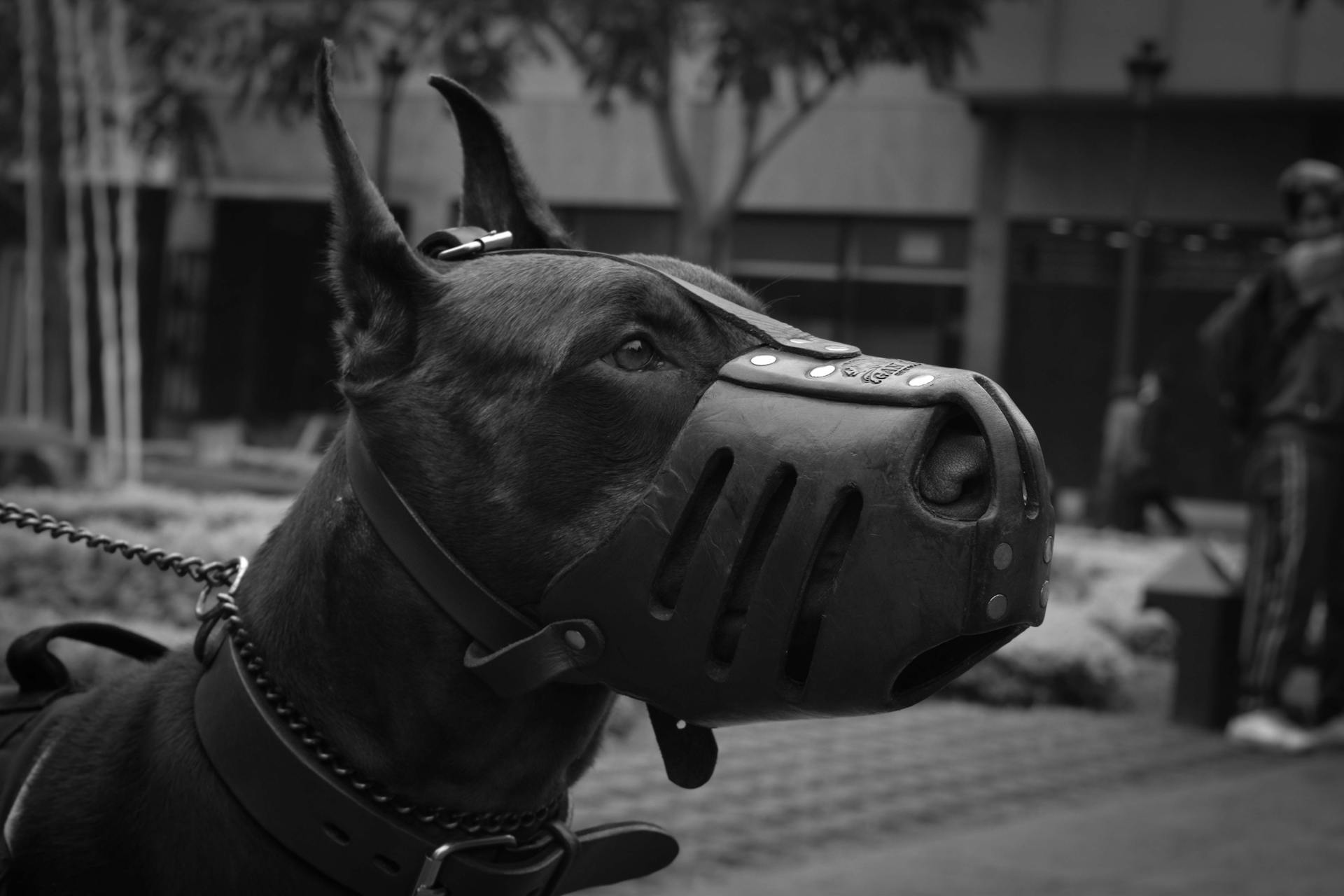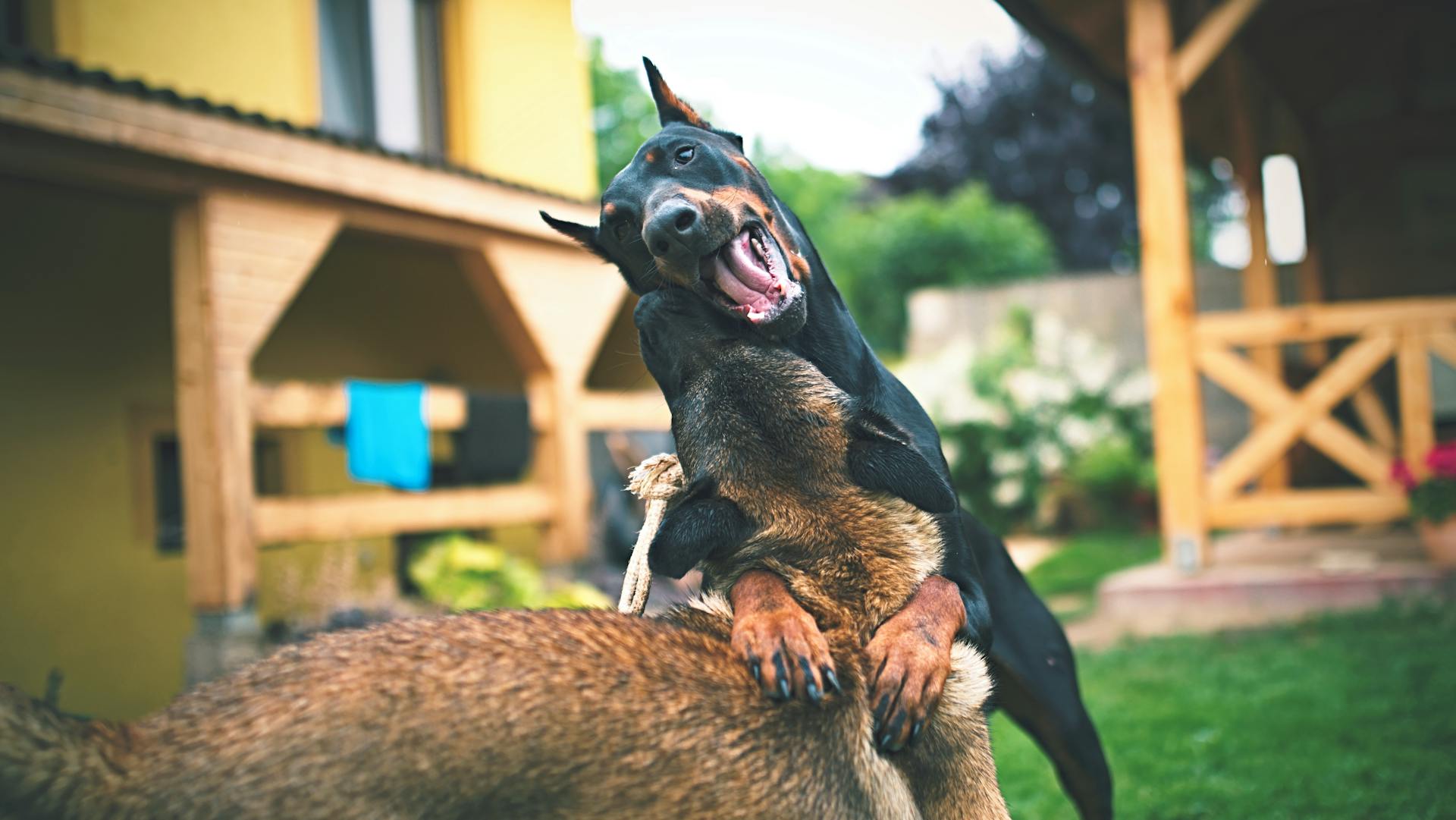
Doberman Pinschers are known for their loyal and loving nature, making them excellent family pets.
They were originally bred as guard dogs, and this instinctual loyalty remains a defining characteristic of the breed.
Doberman Pinschers are naturally protective, but they are not naturally aggressive.
Their intelligence and trainability make them highly responsive to positive reinforcement training.
With proper socialization, Doberman Pinschers can thrive in a variety of living situations, from apartments to homes with yards.
Personality and Temperament
Doberman Pinschers are known for their intelligence and loyalty, but they can also be quite protective of their family. They're often referred to as "velcro dogs" because they love to be close to their owners.
Doberman Pinschers are naturally alert and brave, making them great watchdogs. They'll stand guard in unfamiliar environments and can be quite vocal when they sense potential danger.
To avoid separation anxiety, it's essential to socialize your Doberman puppy early on and introduce them to various people and environments. This will help them become confident and calm in new situations.
Doberman Pinschers thrive on attention and positive reinforcement training. They're sensitive dogs and respond well to kindness and consistency. With proper training and exercise, they can become an excellent family companion.
Here are some key traits to keep in mind when considering a Doberman Pinscher:
Overall, Doberman Pinschers make excellent family pets for those who are willing to invest time and effort into their training and socialization.
Care and Training
Doberman pinschers are highly trainable and motivated to please their owners. They thrive on structure and clear rules, and consistent training is key to their success.
To keep your Doberman happy and well-behaved, it's essential to provide them with plenty of exercise and mental stimulation. Dr. Sophie Liu recommends running around for an hour or two per day, which will help their training time to sink in.
You should also use positive reinforcement when training your Doberman, as they love hearing praise and rewards. Avoid using shock collars or aggression, as this can make them timid or vicious.
For another approach, see: Doberman Dog Training
Here are some key training tips for Dobermans:
Dobermans are highly intelligent and active dogs that require regular exercise and mental stimulation to prevent boredom and destructive behavior. By following these training tips and providing plenty of exercise and attention, you can strengthen the bond between you and your Doberman and help them become a well-behaved and loyal companion.
If this caught your attention, see: Doberman Pinscher Exercise Needs
Living Needs
A Doberman's living needs are pretty straightforward - they need a lot of physical and mental exercise to be content. They're not couch potatoes, so expect to spend at least an hour or two per day on activities like running, playing fetch, or going on a neighborhood hike.
A fenced-in backyard is ideal, but Dobermans can adapt to apartment life if you're willing to provide daily mental and physical enrichment. This can include training classes, agility, nose work, or flyball competitions.
Dobermans need to be socialized properly and introduced to other dogs and cats at a young age to get along well. However, they're not recommended for homes with small children due to their size and energetic personality.
Discover more: Doberman Pinscher Not Cropped
If their physical and mental needs aren't met, Dobermans can gain weight quickly, leading to health concerns, and experience stress and anxiety. To prevent this, make sure to provide a variety of stimulating activities and outlets for their energy.
It's also essential to establish a consistent and fair training routine that extends to all members of your family, so the rules are clear and their routine is stable. This will help prevent unwanted behaviors like barking at squirrels, which is common in Dobermans due to their high prey drive and vocal tendencies.
Training Your Doberman
Training your Doberman requires a job to do and problems to solve, taking advantage of their abundant physical and mental energy. They need to run around for an hour or two per day to be really happy, which gives their training time to sink in.
Consistency is key in training Dobermans, as they're sensitive dogs. Everyone in the family should treat them the same way, so the rules are clear and their routine is stable. This consistency helps prevent unwanted behaviors like barking at squirrels, which is common due to their high prey drive and vocal tendencies.
A training regimen is essential to harness their energy and abilities, and to strengthen the bond between you and your Doberman. Dr. Sophie Liu recommends rewarding good behavior, like telling your Doberman to do something else instead of barking, and giving them praise and rewards.
Dobermans thrive with positive reinforcement training, which helps connect a positive connection between the action being trained and the treat. Avoid using shock collars or aggression, as this can make them timid or vicious.
To train your Doberman, show them you're the boss and they must obey your rules. They grow incredible bonds with their leader, and when they believe you're the master, they'll be much easier to train. A larger fenced area is ideal for training, and incorporating obedience training will give you the best results.
Here's a quick rundown of Doberman exercise needs:
Considering Ownership
Living with a Doberman pinscher is a huge responsibility. They're big, powerful, and smart, and an owner who's not ready to give them the attention they need may end up in a situation that's bad for dog and human alike.
Dobermans may not get along with children who don't approach them properly. Supervise interactions between dogs and kids at all times.
A well-socialized Doberman will stick by their owner. Their personalities, vocalizations, and loyalty to their people are reasons that many swear by the breed.
You're starting a relationship with an individual who may not conform to your expectations of the breed. Consider fostering or talking in detail with those who have been looking after an adult dog before bringing it home.
Dogs' personalities may change over time, just like people do.
For your interest: Doberman Pinscher Standard
Frequently Asked Questions
Is a Doberman a good family dog?
A Doberman can make a great family pet, but they often form a strong bond with one person, making them a loyal companion. With proper socialization, they can thrive in a family environment.
Are Doberman pinschers cuddly?
Doberman pinschers are loving and social dogs that thrive on human interaction and affection, making them a great fit for families who enjoy cuddling with their pets. They will often ask for cuddles and don't like to be left alone for too long.
Are Dobermans clingy dogs?
Dobermans are known to form strong bonds with their owners, which can sometimes lead to clingy behavior and separation anxiety if left alone for extended periods. This loyalty can be a double-edged sword for owners who need to leave their dogs unattended.
Sources
- https://dpca.org/publiced/living-with-a-dobe/temperament/
- https://www.britannica.com/animal/Doberman-pinscher
- https://www.dailypaws.com/dogs-puppies/dog-breeds/doberman-pinscher
- https://www.thefarmersdog.com/digest/doberman-pinscher-care-guide-personality-history-food/
- https://www.servicedogtrainingschool.org/blog/doberman-pinscher-service-dog
Featured Images: pexels.com


